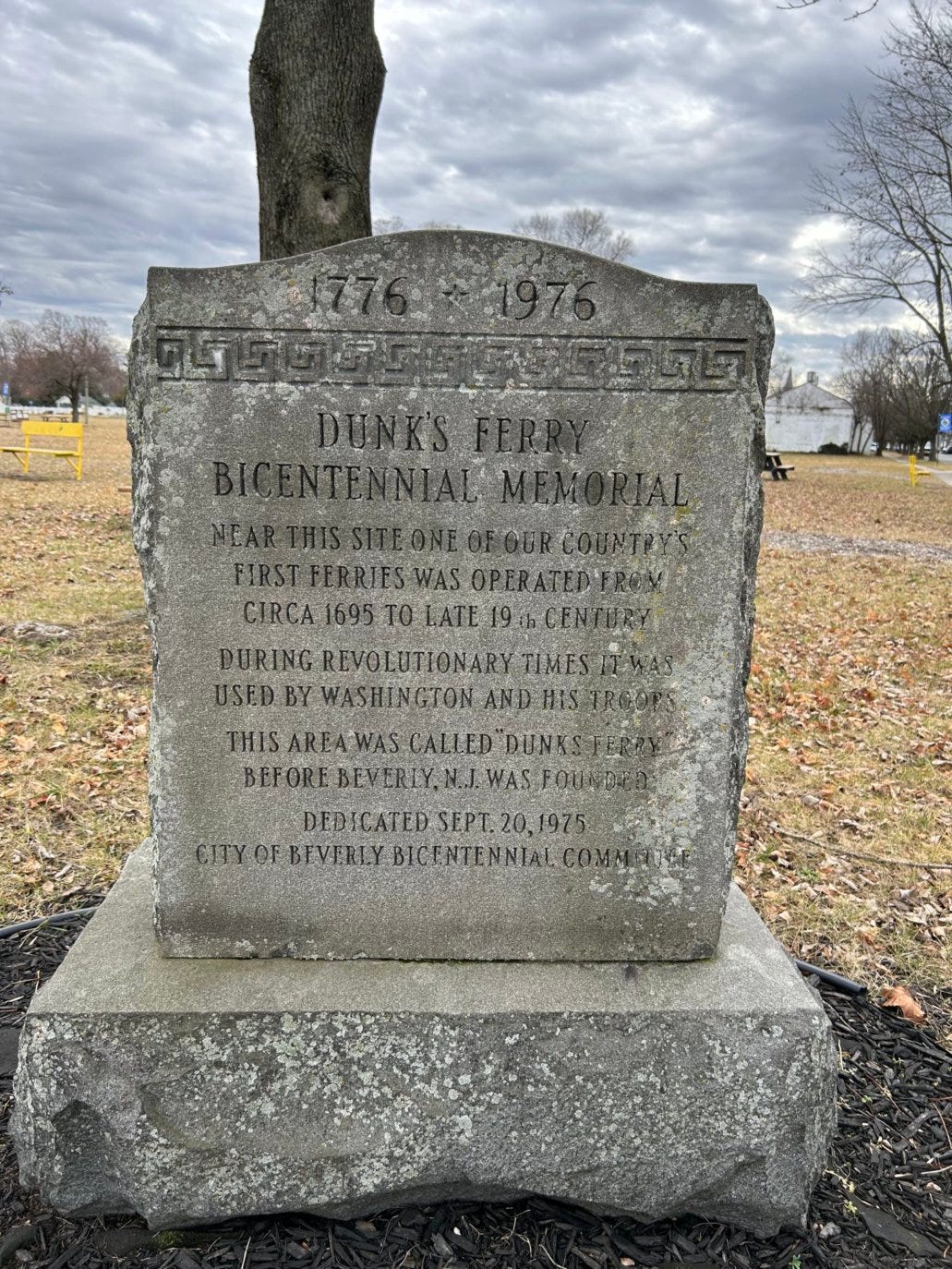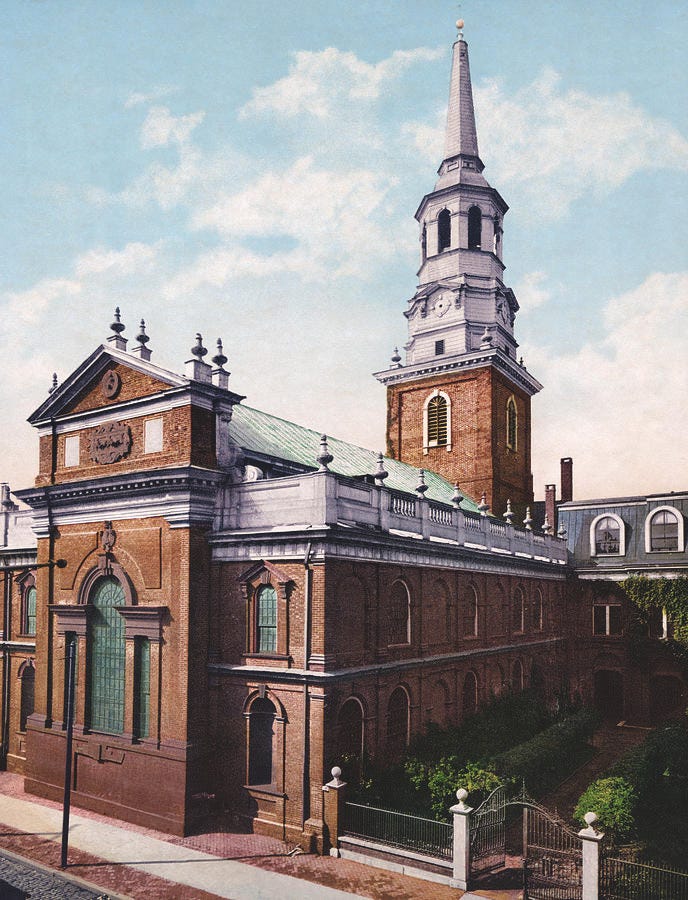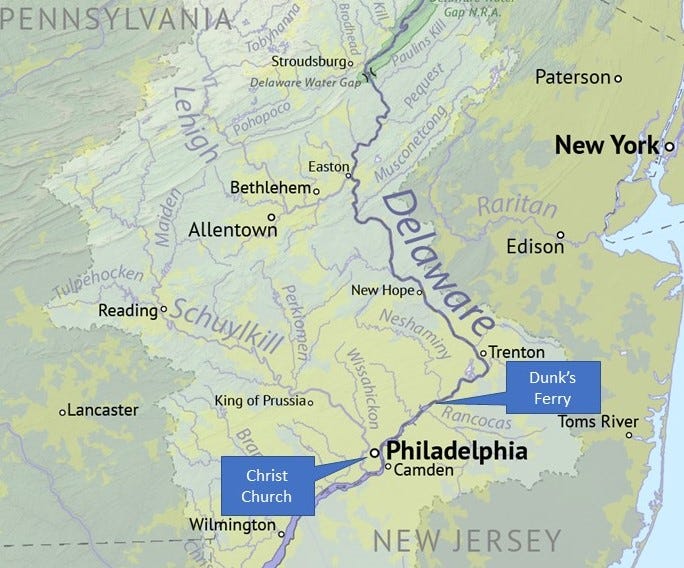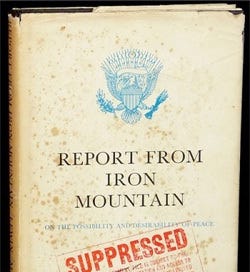

Discover more from Frederick R. Smith Speaks
The Original Alice of Wonder
Alice of Dunk’s Ferry is an inspiring African American woman born late in the 17th century and died in the early 19th Century!
Foreword
This post is a continuation of my history essays brought alive by my life experience of walking in the footsteps of our Founders. Those of us who grew up in the land of our founding have a unique moniker when visiting historical spots from the colonial period. It goes like this: “Washington slept here.”
This essay is about an enslaved woman and is not meant to downplay that horrible institution. Nevertheless, it is a joy and privilege to bring alive the life of an obscure but great woman from our founding. I hope you enjoy reading this as much as I relished the research and writing.
Introduction
It is an honor to present Alice of Dunk’s Ferry, a little-known but inspiring African American woman born late in the 17th Century who died in the early 19th Century. First up, a review of Dunk’s Ferry.
Dunk’s Ferry
Dunk’s Ferry is a historic area in Bensalem Township of Bucks County, Pennsylvania. It is 17 miles north of Center City, Philadelphia, along the Delaware River’s banks. The Dunk family, early settlers in the area, gave the area its name. Established in the late 18th Century, the community has a rich history that spans over two centuries.
The area known as Dunk’s Ferry was a thriving community with a bustling port along the Delaware River. It was an important transportation hub, connecting communities along the river and serving as a critical trade route. The ferry also played a significant role in the American Revolution. American and British troops used the ferry to cross the Delaware River between Pennsylvania and New Jersey.
Besides the river shuttle, Dunk’s Ferry was home to several gristmills and sawmills that provided jobs and resources for the community. The community also had a school and a church, which served as important gathering places for the residents.
With the railroad’s arrival in the late 1800s, the ferry's importance began to decline, and the community became less bustling. Despite this, Dunk’s Ferry has managed to maintain its historical significance. It is a destination for those interested in Pennsylvania and New Jersey’s rich history.
Today, Dunk’s Ferry no longer exists as a town, but it is a quiet residential area within Bensalem Township with a strong sense of history and community. A bridge between Bristol, Pennsylvania, and Burlington, New Jersey, replaced the ferry. Remnants of the old ferry landing serve as a reminder of the community’s rich history. The gristmills and sawmills have long since disappeared, but their legacy remains.
Alice of Dunk’s Ferry
Alice of Dunk’s Ferry was an enslaved but towering woman who lived in the Philadelphia area during our colonial period and early years under the Constitution. Dr. Samuel Coates, head of the Philadelphia Hospital and a leading citizen, was interested in Alice’s life. With his support, a biography was penned about Alice while she was still alive. Isaiah Thomas published a book of biographies in 1804 that includes a portrait of her life. She was known variously as Alice, Alice of Dunk’s Ferry, Black Alice, or Old Alice. Available records do not indicate her marital status, children’s names, or siblings. It is assumed Alice never married.1
Alice claimed she was born in Philadelphia around 1686. She lived an incredibly long life and eventually passed away in 1802, with her age being a topic of dispute. Accounts range from 108 to 116 years old. According to Alice, her parents were enslaved Africans brought to Philadelphia from Barbados as part of the city’s first shipment of enslaved people in 1684. Despite a lack of concrete evidence, Alice held onto her conviction about her heritage.
From age 5 to 10, she worked at a tavern near Independence Hall. By her own account, Alice was about 7 or 8 when she lit the pipe of William Penn while on his second tour of Pennsylvania.
Samuel Carpenter, a friend of William Penn, owned Alice. At age ten, Carpenter relocated Alice to Dunk’s Ferry, north of Philadelphia, where she lived for the rest of her life. In time, she managed the ferry operation between Pennsylvania and New Jersey. The boats, driven by oars, carried people, horses, and other livestock. In the winter, when there was ice, she could order the passengers to help get the boat over the ice.
Alice also set up fisheries, gathering shad packed in salt in barrels and sold in Philadelphia and to ships leaving on voyages. It is essential to note Alice’s little-known entrepreneurial activities. Over the years, she profited herself, her many masters, and the community.
Vivid memories of the land that would later become Philadelphia remained with Alce until her death. Those recollections are from when it was a wilderness inhabited by Native Americans who hunted wild game in the woods. Panthers, wolves, and other forest creatures roamed about the wigwams and cabins of the Native Americans.
An extraordinary blend of sensibility, intelligence, and exceptional memory remained with Alice until her last days. She mesmerized those around her with her keen observations and insightful remarks. Many sought her to glean knowledge about the population and progress of Philadelphia and the nation. Alice was particularly fascinated with the early settlers’ direct descendants, as she often engaged them with cherished anecdotes about their ancestors. Her connections made her conversations all the more captivating, leaving a lasting impression on those with the privilege to interact with her.
Alice’s recollections included notable figures such as William Penn, the proprietor of Pennsylvania, Thomas Story, James Logan, and other distinguished personalities of that era. Despite being an object of slavery and lacking formal education, Alice had a dignified deportment. Many respected individuals regarded her innocent cheerfulness. They called upon her, all charmed by her remarkable presence and engaging demeanor.
Philadelphia’s growth occurred under Alice's watchful eye. She pointed out the oldest brick building southward of the Episcopal Church on Second Street, the first of its kind in the area. Its evident marks of antiquity supported Alice’s assertion. According to Alice, the original church was a small frame structure that occupied the same spot as the present building. It had a ceiling she could reach from the floor with her hands.
As a devout member of the Episcopal Society, Alice faithfully attended public worship for as long as she lived. Her zeal for this duty was such that she often traveled on horseback, galloping 17 miles to church and back, even at the remarkable age of 95. Despite her inability to read the Bible herself, she revered it. Her friends would kindly read it to her upon her request. Alice would listen attentively, often making insightful remarks about its contents.
Alice was a longtime member of Christ Church, attended by George Washington, Benjamin Franklin, Benjamin Rush, Robert Morris, and others. She had a temperate lifestyle and an unwavering commitment to truthfulness. Alice earned a reputation for impeccable integrity. Her honesty was also unquestioned, as her master held utmost confidence in her. He entrusted her with the collection of ferriage money for over forty years. Later in life, Alice often stayed in Philadelphia on Sunday nights with friends. Respectable citizens of every quarter came to call on her to hear stories about their forebears.
Even as she grew older, Alcie’s hearing and mental acuity remained intact until the end of her life. Her vision started to fail in her ninety-sixth year, with no cause other than the natural effects of old age. When she reached one hundred, Alice had become completely blind and could not even see the sun at noon.
Even though her last master had excused her from her usual labor due to her advanced age, Alice could not bear to be idle. Having been accustomed to constant work since childhood, she found solace in fishing. Despite losing sight, she displayed remarkable skill in rowing herself into the middle of a stream, where she would return with ample fish. Her determination and expertise in fishing persisted even in this late stage of her life, showcasing her extraordinary resilience and resourcefulness. Alice’s unwavering spirit and tenacity were genuinely remarkable, serving as a testament to her endearing character.
Approaching the remarkable age of 102, a miraculous event occurred - Alice’s sight began to return. She could only perceive objects in motion and could not distinguish individuals. In the final years of her life, her once dark hair turned completely white, and she lost the last of her teeth, which had remained otherwise sound.
Alice passed away in 1802, just north of Dunk’s Ferry in Bristol, Pennsylvania. Her life was a testament to her resilience, perseverance, and remarkable longevity. She left a legacy remembered for generations. While her exact date of birth is questionable, she was born in the late 17th Century. Thus, she lived and experienced three centuries.
Conclusion
The life of Alcie was a testament to the strength of the human spirit in the face of adversity. Despite being born into slavery, she possessed intelligence, memory, honesty, and resilience. Alice’s remarkable longevity and ability to adapt to changing circumstances were awe-inspiring. Her legacy inspires generations, and she remains a beloved figure in the history of Philadelphia. Alice is a symbol of courage and perseverance in the face of challenges. She is a beacon of hope for all who strive to overcome obstacles and leave a lasting impact on the world.
Here’s to the wonderful Alice of Dunk’s Ferry, an African Founder of our nation: you now have a renewed interest through my readers. 📕
Sources
Eccentric Biography; or Memoirs of remarkable female characters, ancient and Modern ~ Isaiah Thomas (publisher), 1804
African Founders; How Enslaved People Expaned American Ideals ~ David Hackett Fischer ~ 941 pages, Simon & Schuster (publisher), May 2022
Marking Juneteenth with slave’s tale (Inquirer.com)
Life of enslaved ferry operator honored (courierpostonline.com)
Dunks Ferry in Pennsylvania (Pennsylvania Genealogy)
Alice (librarycompany.org)
Discussion in Yardley brings to life Alice of Dunks Ferry (phillyburbs.com)
A book in the works
Coming soon ~ Alice: An Enslaved Woman in Early America, a new book by renowned author and historian Susan E. Klepp.
In a Youtube video, a woman plays the part of Alice in a monologue. The actress, Sunni Green Tolbert, talks about bearing a daughter from a relationship with one of her master’s sons.
Subscribe to Frederick R. Smith Speaks
The Frederick R. Smith blog is the ramblings of an uncommon man in a post-modern world. As a master of few topics, your author desires to give readers a sense of the thoughts of a senior citizen who lived most of his life before the new normal.




















Thank you for writing this. More stories of real women like Alice need to be told... and fewer about the so-called courage of the fake ones.
A great story about another FEMALE AMERICAN. Good work and thank you Frederick👍